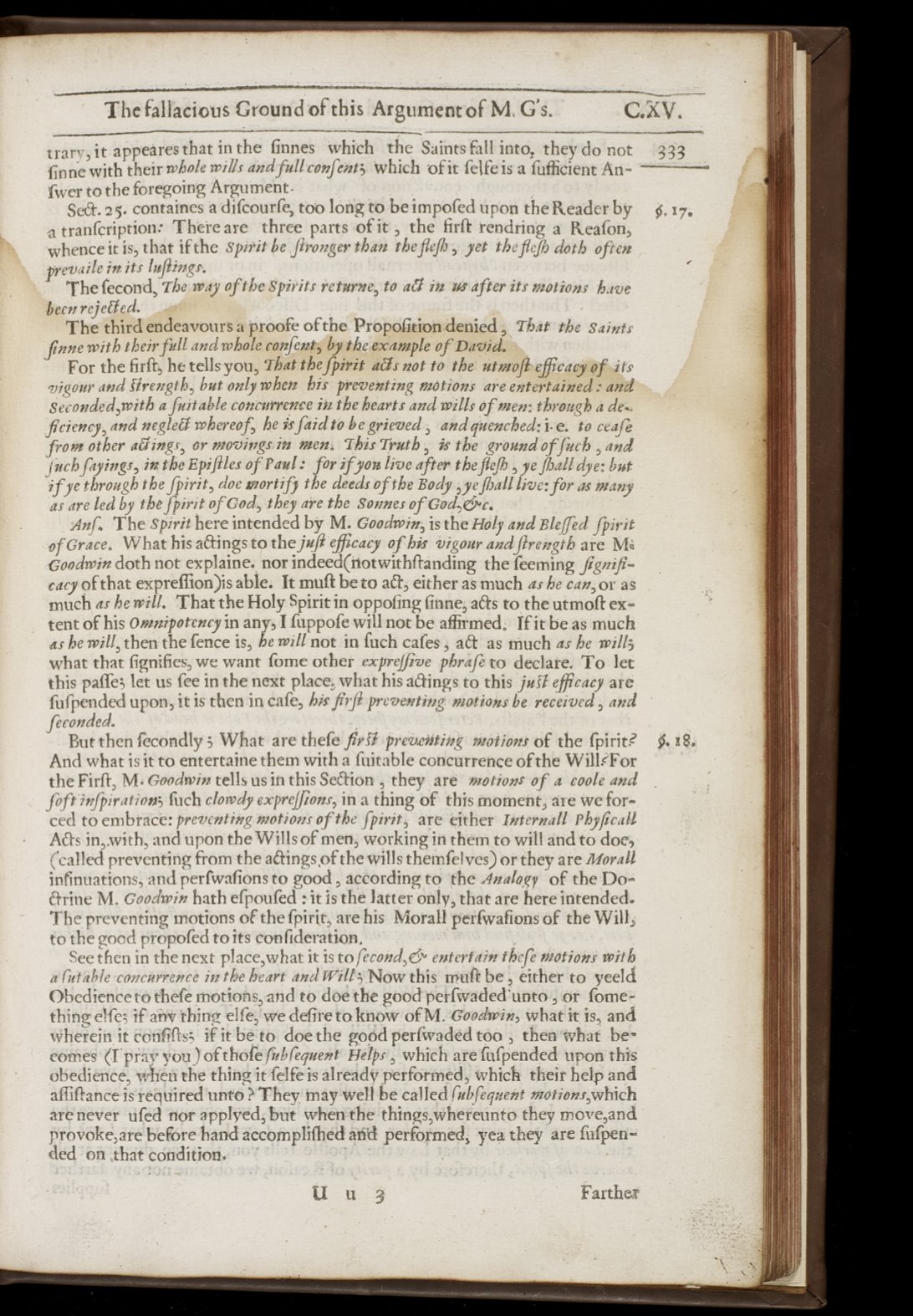

The
fallacious Ground
of
this Argument
of
M, G's.
tran,
it
appeares
that
in
the
finites
which
the
Saints fall
into, they do not
333
finite
with
their
whole
wills
and
full
confent;
which
of
it
felfe
is
a fufficient
An-
swer
to the
foregoing
Argument.
Se
&.
25.
containes
a
difcourfe,
too long to beimpofed
upon
the Reader by
0.17-
a tranfcription:
There
are
three
parts
of
it
,
the
firft
rendring
a
Reafon,
whence it
is,
that if the spirit
be
flronger than
the
flefh
;
yet
the
fiqfh cloth
often
prevarlein its
lufirngr.
The
fecund,
The
way
of
t
he
spirits
returne,
to
aa
in
nrr
after its
motions have
been
rejelt
ed.
The
third
endeavours
a
proofe
ofthe
Propofition.denied ,
That
the
saint
finite with theirfìrll and
whole confent,
by
the example
of
David.
For the
firft,
he tells
you,
That the
fpirit
ae`ïs
not
to
the utnrofl
efficacy
of
its
vigour
and flrength, but
only
when
his preventing
motions
are
entertained
:
and
Seconded,with a
fuitable
concurrence
in the hearts
and
wills
of
men:
through
a
de._
ficiency,
and neglea
whereof,
he
is
faid
to
be
grieved
and
quenched:
i.e.
to ceafe
front
other
aaings,
or movings in men: This Truth ,
is
the
ground
of
filch
,
and
filch
fayings, in the
Epiflles
of
Paul:
for
ifyou
live
after
the
flefh
, ye
fball
dye:
bat
if
ye through
the
fpirit,
doe
mortify
the
deeds
of
the
Body
,yeJballlive:
for
as
many
as
are led
by
the
fpirit of
God,
they
are the
Sonnes
of
God,
&c.
A
:f.
The
spirit here intended
by
M.
Goodwin, is
the
Holy
and
Bleffed
fpirit
of
Grace.
What
his a&ings
to the
jxfl
efficacy
of
his
vigour
andflrength are
Mà
Goodwin
doth not
explaine.
nor indeed(notwithftanding the kerning ftgnifl
cacy
ofthat
exprefiion)is able.
It
muff
be
to
a
&,
either
as
much
as
he
can,
or
as
much
as
he
will.
That
the
Holy
Spirit
in
oppofing
finne,
a
&s
to the utmoft ex-
tent of
his omnipotency
in any, I fuppofe will
not be
affirmed;
If
it be
as
much
as
he
will,
then the
fence
is,
he
will
not
in filch cafes ,
aa
as
much
as
he
will;
what
that
fignifies,
we
want
fome
other
expreve
phrafe
to
declare.
To let
this
paffe;
let
us fee in
the
next
place,
what
his aélings
to this
ju
fl
efficacy
are
fufpended upon,
it
is
then
in cafe,
his
fir
fl
preventing
motions
be
received, and
feconded.
But
thenfecondly; What
are thefe
firff
preventing
motions
of
the fpirit?
ß.t8:
And
what
is
it
to
entertaine them
with
a
faisable
concurrence
of
the Will?For
the
Firft, M.
Goodwin
tells
us
in this
Se
&ion
,
they are
motions
of
a
coole
and
foftinfpiration;
fuch dowdy expreffons, in a
thing
of
this moment, are
we
for-
ced
to embrace:
preventing motions
of
the
fpirit,
are either
Internal! Phy(call
A&s
in,.with, and upon
theWills
of
men, working
in
them
to
will
and
to
doe,
('called
preventing
from
the
a&ings.of
the
wills
themfelves)
or
they are
Moral!
infinuations,
and
perfwafions
to
good
,
according
to
the
Analogy
of
the
Do-
aline
M.
Goodwin
hath
efpoufed
:
it
is
the
latter
only,
that
are here
intended.
The
preventing motions
of
the fpirit,
are
his
Morall
perfwafions
of
the
Will,
to the
good propofed
to
its can fideration.
See
then
in
the next place,what
it
is
to
fecond,& entertain
thefe Motions
with
a ratable
concurrence
in
the
heart and
Will;
Now
this
ntetff
be,
either
to
yeeld
Obedience
to
theme
motions,
and
to
doe
the
good perfwaded'unto
,
.or
fome-
thing
elfe;
if
anv
thing
elfe, we defire
to
know
of
M.
Goodwin,
what
it
is,
and
wherein it
confiffs;
if
it
be to doe
the
good perfwaded
too
,
then what
be-
comes
(I
pray
you)
ofthofefuh(equent Helps, which
are
fufpended upon this
obedience, when the
thing it
felfe
is
already performed, which their help and
aff
fiance
is
required
unto? They
may well
be called
('ubrequent
motions,which
are
never ufed
nor applyed,
but
when
the things,whereunto
they
move,and
provoke,are before hand
accompiifhed
and performed, yea they are fufpen-
ded
on
that
condition.
C.XV.
U
u
2
Farther










